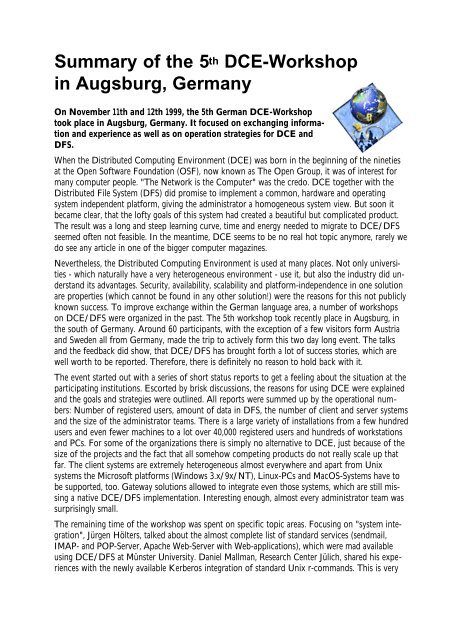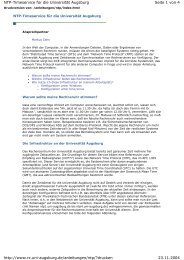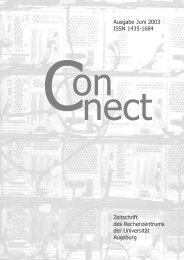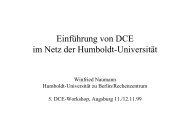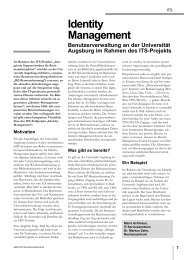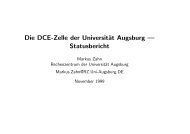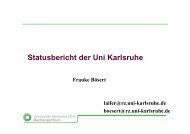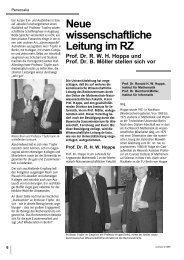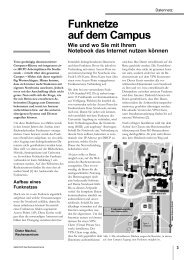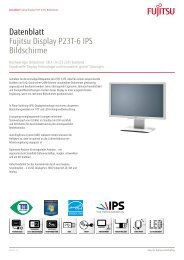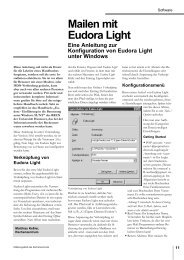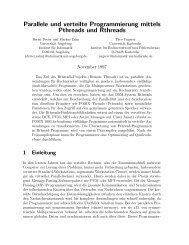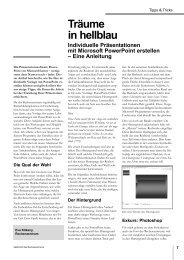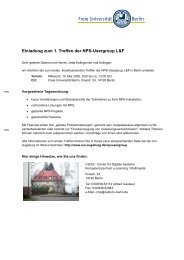Summary of the 5th DCE-Workshop in Augsburg, Germany
Summary of the 5th DCE-Workshop in Augsburg, Germany
Summary of the 5th DCE-Workshop in Augsburg, Germany
You also want an ePaper? Increase the reach of your titles
YUMPU automatically turns print PDFs into web optimized ePapers that Google loves.
<strong>Summary</strong> <strong>of</strong> <strong>the</strong> 5 th <strong>DCE</strong>-<strong>Workshop</strong><br />
<strong>in</strong> <strong>Augsburg</strong>, <strong>Germany</strong><br />
On November 11th and 12th 1999, <strong>the</strong> <strong>5th</strong> German <strong>DCE</strong>-<strong>Workshop</strong><br />
took place <strong>in</strong> <strong>Augsburg</strong>, <strong>Germany</strong>. It focused on exchang<strong>in</strong>g <strong>in</strong>formation<br />
and experience as well as on operation strategies for <strong>DCE</strong> and<br />
DFS.<br />
When <strong>the</strong> Distributed Comput<strong>in</strong>g Environment (<strong>DCE</strong>) was born <strong>in</strong> <strong>the</strong> beg<strong>in</strong>n<strong>in</strong>g <strong>of</strong> <strong>the</strong> n<strong>in</strong>eties<br />
at <strong>the</strong> Open S<strong>of</strong>tware Foundation (OSF), now known as The Open Group, it was <strong>of</strong> <strong>in</strong>terest for<br />
many computer people. "The Network is <strong>the</strong> Computer" was <strong>the</strong> credo. <strong>DCE</strong> toge<strong>the</strong>r with <strong>the</strong><br />
Distributed File System (DFS) did promise to implement a common, hardware and operat<strong>in</strong>g<br />
system <strong>in</strong>dependent platform, giv<strong>in</strong>g <strong>the</strong> adm<strong>in</strong>istrator a homogeneous system view. But soon it<br />
became clear, that <strong>the</strong> l<strong>of</strong>ty goals <strong>of</strong> this system had created a beautiful but complicated product.<br />
The result was a long and steep learn<strong>in</strong>g curve, time and energy needed to migrate to <strong>DCE</strong>/DFS<br />
seemed <strong>of</strong>ten not feasible. In <strong>the</strong> meantime, <strong>DCE</strong> seems to be no real hot topic anymore, rarely we<br />
do see any article <strong>in</strong> one <strong>of</strong> <strong>the</strong> bigger computer magaz<strong>in</strong>es.<br />
Never<strong>the</strong>less, <strong>the</strong> Distributed Comput<strong>in</strong>g Environment is used at many places. Not only universities<br />
- which naturally have a very heterogeneous environment - use it, but also <strong>the</strong> <strong>in</strong>dustry did understand<br />
its advantages. Security, availability, scalability and platform-<strong>in</strong>dependence <strong>in</strong> one solution<br />
are properties (which cannot be found <strong>in</strong> any o<strong>the</strong>r solution!) were <strong>the</strong> reasons for this not publicly<br />
known success. To improve exchange with<strong>in</strong> <strong>the</strong> German language area, a number <strong>of</strong> workshops<br />
on <strong>DCE</strong>/DFS were organized <strong>in</strong> <strong>the</strong> past. The <strong>5th</strong> workshop took recently place <strong>in</strong> <strong>Augsburg</strong>, <strong>in</strong><br />
<strong>the</strong> south <strong>of</strong> <strong>Germany</strong>. Around 60 participants, with <strong>the</strong> exception <strong>of</strong> a few visitors form Austria<br />
and Sweden all from <strong>Germany</strong>, made <strong>the</strong> trip to actively form this two day long event. The talks<br />
and <strong>the</strong> feedback did show, that <strong>DCE</strong>/DFS has brought forth a lot <strong>of</strong> success stories, which are<br />
well worth to be reported. Therefore, <strong>the</strong>re is def<strong>in</strong>itely no reason to hold back with it.<br />
The event started out with a series <strong>of</strong> short status reports to get a feel<strong>in</strong>g about <strong>the</strong> situation at <strong>the</strong><br />
participat<strong>in</strong>g <strong>in</strong>stitutions. Escorted by brisk discussions, <strong>the</strong> reasons for us<strong>in</strong>g <strong>DCE</strong> were expla<strong>in</strong>ed<br />
and <strong>the</strong> goals and strategies were outl<strong>in</strong>ed. All reports were summed up by <strong>the</strong> operational numbers:<br />
Number <strong>of</strong> registered users, amount <strong>of</strong> data <strong>in</strong> DFS, <strong>the</strong> number <strong>of</strong> client and server systems<br />
and <strong>the</strong> size <strong>of</strong> <strong>the</strong> adm<strong>in</strong>istrator teams. There is a large variety <strong>of</strong> <strong>in</strong>stallations from a few hundred<br />
users and even fewer mach<strong>in</strong>es to a lot over 40,000 registered users and hundreds <strong>of</strong> workstations<br />
and PCs. For some <strong>of</strong> <strong>the</strong> organizations <strong>the</strong>re is simply no alternative to <strong>DCE</strong>, just because <strong>of</strong> <strong>the</strong><br />
size <strong>of</strong> <strong>the</strong> projects and <strong>the</strong> fact that all somehow compet<strong>in</strong>g products do not really scale up that<br />
far. The client systems are extremely heterogeneous almost everywhere and apart from Unix<br />
systems <strong>the</strong> Micros<strong>of</strong>t platforms (W<strong>in</strong>dows 3.x/9x/NT), L<strong>in</strong>ux-PCs and MacOS-Systems have to<br />
be supported, too. Gateway solutions allowed to <strong>in</strong>tegrate even those systems, which are still miss<strong>in</strong>g<br />
a native <strong>DCE</strong>/DFS implementation. Interest<strong>in</strong>g enough, almost every adm<strong>in</strong>istrator team was<br />
surpris<strong>in</strong>gly small.<br />
The rema<strong>in</strong><strong>in</strong>g time <strong>of</strong> <strong>the</strong> workshop was spent on specific topic areas. Focus<strong>in</strong>g on "system <strong>in</strong>tegration",<br />
Jürgen Hölters, talked about <strong>the</strong> almost complete list <strong>of</strong> standard services (sendmail,<br />
IMAP- and POP-Server, Apache Web-Server with Web-applications), which were mad available<br />
us<strong>in</strong>g <strong>DCE</strong>/DFS at Münster University. Daniel Mallman, Research Center Jülich, shared his experiences<br />
with <strong>the</strong> newly available Kerberos <strong>in</strong>tegration <strong>of</strong> standard Unix r-commands. This is very
<strong>in</strong>terest<strong>in</strong>g s<strong>in</strong>ce <strong>the</strong> <strong>DCE</strong> security-server started to be usable as Key Distribution Center (KDC)<br />
for Kerberos (start<strong>in</strong>g with <strong>DCE</strong> Version 1.2.2). Ralf Utermann and Markus Zahn, <strong>Augsburg</strong> University,<br />
talked about <strong>the</strong> <strong>in</strong>tegration <strong>of</strong> non <strong>DCE</strong>/DFS aware client platforms and <strong>the</strong>ir university's<br />
strategy for W<strong>in</strong>dows, MacOS and L<strong>in</strong>ux platforms and gave an outlook on <strong>the</strong>ir special <strong>in</strong>tegration<br />
<strong>of</strong> L<strong>in</strong>ux PCs us<strong>in</strong>g a PAM-/NSS-solution, which is nearly completed.<br />
Focus<strong>in</strong>g on "Adm<strong>in</strong>istrative Delegation", Dieter Mack from Hohenheim University, expla<strong>in</strong>ed how<br />
one can delegate <strong>the</strong> adm<strong>in</strong>istration <strong>of</strong> DFS servers and never<strong>the</strong>less restrict <strong>the</strong> rights <strong>of</strong> <strong>the</strong> adm<strong>in</strong>istrators<br />
to <strong>the</strong>ir doma<strong>in</strong>s, i.e. to <strong>the</strong>ir file servers. The talk covered <strong>the</strong> technical background as<br />
well as step by step <strong>in</strong>structions to achieve this special setup. Jochen Hollmann, Chalmers University<br />
<strong>of</strong> Technology, Sweden, presented <strong>the</strong> Chips project from its motivation up to its technical solution,<br />
how to adm<strong>in</strong>istrate such a complex system seamlessly. Roland Laifer, University <strong>of</strong> Karlsruhe,<br />
talked about <strong>the</strong> gotchas <strong>in</strong> <strong>the</strong> bus<strong>in</strong>ess <strong>of</strong> <strong>DCE</strong>/DFS troubleshoot<strong>in</strong>g, illustrat<strong>in</strong>g <strong>the</strong> participants<br />
how to track down all k<strong>in</strong>ds <strong>of</strong> problems. Gerhard Rentschler, Stuttgart University, presented<br />
his <strong>in</strong>sights on LDAP and its usability for or toge<strong>the</strong>r with <strong>DCE</strong>.<br />
F<strong>in</strong>ally, <strong>the</strong> workshop focused on <strong>DCE</strong>/DFS based projects. Stefan Ost, Münster University, started<br />
with an overview <strong>of</strong> a multi-campus comput<strong>in</strong>g project, implemented for <strong>the</strong> state <strong>of</strong> "Nordrhe<strong>in</strong>-Westfalen".<br />
The projects aims to establish a super-comput<strong>in</strong>g <strong>in</strong>frastructure us<strong>in</strong>g <strong>DCE</strong>/DFS<br />
as <strong>the</strong> base technology. Jens Rosenhan, MB&T GmbH, gave <strong>in</strong>terest<strong>in</strong>g <strong>in</strong>sights form his consultant<br />
work, which ma<strong>in</strong>ly takes place <strong>in</strong> <strong>the</strong> <strong>in</strong>dustry. He illustrated, that <strong>DCE</strong>/DFS is not only used<br />
at universities. Big companies based and still base <strong>the</strong>ir strategic decisions on this platform <strong>in</strong>dependent<br />
technology.<br />
To draw <strong>the</strong> conclusions, <strong>the</strong> numerous <strong>in</strong>terest<strong>in</strong>g talks formed a successful event, which was larded<br />
with lots <strong>of</strong> discussions. The participants decided to keep <strong>in</strong> touch even closer. The hope is to<br />
avoid parallel development <strong>of</strong> similar solutions as well as to exchange<br />
even more <strong>in</strong>sights. All talks are available via <strong>the</strong> web at<br />
http://www.RZ.Uni-<strong>Augsburg</strong>.DE/<strong>DCE</strong>/ws-99/ (most <strong>of</strong> <strong>the</strong>m <strong>in</strong><br />
German only). But we are sure that all authors will answer fur<strong>the</strong>r questions,<br />
if any. Thanks to all participants for <strong>the</strong> valuable time. Special<br />
thanks go to <strong>the</strong> Hohenheim University, where <strong>the</strong> next workshop will<br />
be hosted <strong>in</strong> summer 2000. We'll def<strong>in</strong>itely be <strong>the</strong>re, you too?<br />
January 2000, Markus Zahn and Roland Laifer


